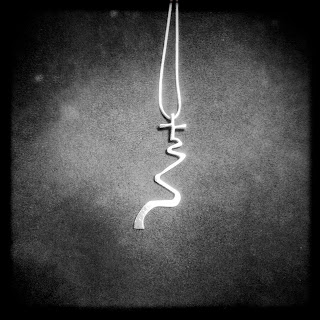“Only an atheist can be a good Christian; only a Christian can be a good atheist.”
 “Only an atheist can be a good Christian; only a Christian can be a good atheist.”
“Only an atheist can be a good Christian; only a Christian can be a good atheist.” “The best thing about religion is that it makes for heretics.”
— Ernst Bloch (Two epigraphs in Atheism in Christianity)
After my morning shower some three months ago the cross (picture on right) I had worn daily for many years fell off; the leather cord had simply worn through. Naturally, I hunted out a length of new leather cord and when, a couple of days later, I came to put the cross back on, to my surprise, I found I couldn’t do it.
Now, regular readers of this blog will know that, although I have a deep, intimate, lifelong existential relationship with Christianity, I find it a tradition about which I have no choice but to be highly critical and this is especially true when it comes to its ("orthodox") understandings of God (its metaphysics). When my cross fell off I was in a particularly critical mood and this undoubtedly contributed to my unwillingness (really my inability at that moment) to put it back on. Even so, I confess that I sorely missed its physical presence around my neck and so I began to cast around for something else that might replace it. Eventually I settled on a depiction of the four seasons, an image that I felt would suit well my religious naturalist inclinations and I decided I would put it on after my last service before my sabbatical, May 1st. On the appointed day I duly carried out my promise.
 My genuine intention was to see how it felt “flying under another banner” until I returned to work in September and before deciding whether or not permanently to keep wearing this new symbol.
My genuine intention was to see how it felt “flying under another banner” until I returned to work in September and before deciding whether or not permanently to keep wearing this new symbol.To my surprise, less than 24 hours after putting it on, I had to take it off — the feeling was surprisingly visceral. It wasn’t so much that the symbol of the seasons was wrong, that I was somehow embarrassed by it, or even that it didn’t express something true about my religious position; no, it was simply that it didn’t speak to the fundamental, existential governing demand in my own religious life and this is why, on the first full day of my sabbatical, I found myself putting the cross back on.
The cross I wear is called “The Way” and it’s huge original is to be found hanging on the north wall of the west tower of Ely Cathedral. When I first saw it it spoke to me with great power because it is cast in the form of a road which may be understood both to be running towards the cross(roads) and also away from the cross(roads). This echoed my own constant attraction to, and movement away, from the cross but it was only in the act of self-consciously choosing to wear another symbol that I was able to be reminded of this so clearly and feel it again so viscerally.
In this particular depiction of the cross I come face to face with Jesus’ infinite ethical demand (found in the Sermon on the Mount) that simultaneously and irresistibly calls me (because of its goodness and beauty) and repels me (because it seems — is — impossible to achieve), namely, the basic teaching that I must love my neighbour and enemy as myself and that it is in these acts of love alone that I will find God, even when the metaphysical God of Christianity has completely gone — and I assure you that, for me, that God is dead.
Even if nothing else is achieved during my sabbatical I feel that this realization will, alone, be enough because it helps me see that my a-theism (which is real) is through and through Christian and it is this Christian Atheist faith that continues viscerally to motivate me both as an individual human being and in my public role as an heretical minister of the gospel.
—o0o—
See also: "A very brief piece of autobiography"
And also Simon Critchley's piece for the New York Times: "The Rigor of Love"
And also Simon Critchley's piece for the New York Times: "The Rigor of Love"


Comments